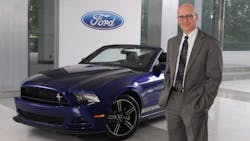Ford Motor Co., cutting its 2017 profit forecast for the second time in three months, said it sees a bumpier future as President-elect Donald J. Trump translates his campaign promises into new policies on trade, tariffs and regulation.
“It feels like a world that’s even more volatile,” Bob Shanks, Ford’s chief financial officer, said in a presentation to analysts today. The Trump administration “is going to be an opportunity for substantial change.”
Complicating matters, those changes are coming just as U.S. auto sales are slowing after a record six straight years of growth--meaning there’s now a glut of used cars that is hurting profit at its Ford Credit unit. On an optimistic note, Shanks said the automaker does expect Trump to have a “pro-growth” strategy for the economy. That might include easing tough fuel-economy regulations to reflect consumers’ preference for trucks and sport utility vehicles--instead of electric cars--in an era of cheap gasoline.
“If the new government is serious about accelerating and growing in a very healthy way the U.S. economy--and I believe it is--I think it will take measures that will enable that,” Shanks said. Hitting Ford with a 35% duty on cars it makes in Mexico and brings back to the U.S., as Trump threatened during the campaign, “would be contrary to that.”
Shanks said he noticed a "change in tone post-election" from Trump that "is very encouraging."
"When Mr. Trump met President Obama, the tone, the dialogue, the mutual respect, the desire to work together, I thought was very, very positive," Shanks said.
Ford is talking to Trump’s transition team, while also speaking with federal regulators about how low gas prices are undermining efforts to get Americans to buy electric cars and hybrids so that automakers can achieve a goal to average more than 50 miles per gallon by 2025.
EV Demand Lags
“There’s been no movement whatsoever for electrified products, which is probably driven by the fact that gas prices are so low,” Shanks said. “It’s just not what any of us had expected, including the government. And it’s going to be very difficult, therefore, to get there without pushing on the customers things they just don’t want.”
More immediately, Ford is still adjusting to a slowing auto market--cutting its forecast for 2017 pretax profits because of declining auction values for used cars. Ford shares fell 0.9% to $11.89 at 3:16 p.m. in New York and had declined 15% this year through yesterday.
Pretax earnings for the automaker’s credit unit next year will be about $1.5 billion, $300 million lower than its previous estimate, the company said Thursday in a regulatory filing. In September, Ford reduced its 2017 profit prediction by $600 million due to rising recall costs. The second-largest U.S. automaker reiterated that it expects total company adjusted pretax profit to drop in 2017 as it invests in “emerging opportunities,” and forecast improvement in 2018.
Hertz Global Holdings Inc. last week cut its annual earnings forecast, citing a drop in used-car values, especially for compact and mid-sized cars, which have come under pressure as American buyers shift to pickups and sport utility vehicles.
Ford has undertaken an extensive, expensive effort to transform itself to take on interlopers including Uber Technologies Inc. and Google. The carmaker has said it will be selling 100,000 robot taxis--without a steering wheel, gas or brake pedals--annually by 2021. It’s also investing $4.5 billion to convert 40% of its product lineup to electrified vehicles by 2020 and has begun offering bike sharing and a commuter van service in San Francisco.
“Clearly the investments we’re making in emerging opportunities, whether it’s electrification or autonomy or mobility, will impact our earnings,” Chief Executive Officer Mark Fields said on Bloomberg TV last month. “Further out, those businesses will start to contribute to the company’s bottom line.”
About the Author
Bloomberg
Licensed content from Bloomberg, copyright 2016.
